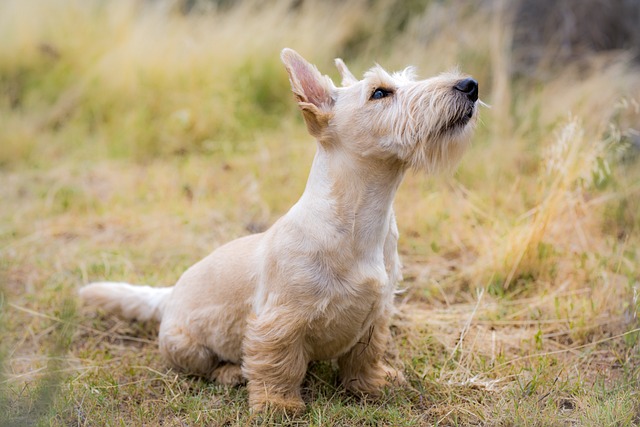


The Cesky Terrier is a small, charming, and intelligent breed with a distinctive appearance and an affectionate nature. Originally bred for hunting purposes, the Cesky Terrier is known for its keen sense of smell and determination. This breed is particularly suited to families and individuals looking for a loyal, low-maintenance companion that can adapt to various living environments, including apartments. Cesky Terriers are often described as confident, alert, and playful, making them excellent companions for active people who are ready to engage them mentally and physically.
The Cesky Terrier, also known as the Bohemian Terrier, originated in the Czech Republic in the early 20th century. The breed was created by a Czech breeder named Frantisek Horak, who wanted to develop a dog that could effectively hunt small game, such as rats, foxes, and other burrowing animals. To achieve this, he crossed the Scottish Terrier with the Sealyham Terrier, resulting in a breed that retained the feisty spirit of terriers while being smaller and more agile. The Cesky Terrier was initially used for hunting and as a working dog, but it eventually became a companion breed, recognized for its friendly nature and adaptability. The Cesky Terrier was officially recognized by the FCI (Fédération Cynalogique Internationale) in 1963.
The Cesky Terrier is a small, sturdy dog with a long, silky coat that gives it a distinctive appearance. Adult Cesky Terriers typically stand between 10 to 12 inches at the shoulder and weigh between 13 to 18 pounds. They have a compact, rectangular body with a deep chest and short, strong legs. The head is broad with a slight curve to the skull and a distinctive beard and eyebrows. Their eyes are dark and almond-shaped, giving them an alert and friendly expression. The breed’s most notable physical feature is its coat, which is usually gray or blue, and can range from light silver to dark steel blue. The coat requires regular grooming to keep it looking its best and to prevent matting. The Cesky Terrier’s tail is typically carried high and has a slight curve, giving it a cheerful and lively appearance.
The Cesky Terrier is known for its affectionate, loyal, and friendly temperament. It forms strong bonds with its family and enjoys spending time with its human companions. Despite being a terrier, the Cesky Terrier is generally less independent and more people-oriented than other terrier breeds. It is typically good with children and other pets, including other dogs, if properly socialized. This breed is alert and confident, often making an excellent watchdog despite its small size. While Cesky Terriers are not overly aggressive, they can be wary of strangers and may bark to alert their family to unusual activity. The Cesky Terrier’s calm nature makes it well-suited for apartment living, provided it receives enough exercise and attention.
While the Cesky Terrier is a relatively small breed, it still has moderate exercise needs. Daily walks, playtime, and mental stimulation are important for keeping the breed happy and healthy. Cesky Terriers enjoy outdoor activities like running and exploring, but they do not require as much exercise as larger breeds. A well-balanced routine of walks and play, combined with some time in a securely fenced yard, is usually enough to satisfy the breed’s energy levels. Because of their hunting background, Cesky Terriers may have a strong prey drive, so it is important to keep them on a leash or in a secure area when outside. Interactive toys and puzzle games can also help engage their sharp minds.
Cesky Terriers are intelligent, eager to please, and relatively easy to train compared to other terrier breeds. They respond well to positive reinforcement methods, such as treats, praise, and play. Early training and socialization are important to ensure that the Cesky Terrier grows up to be well-behaved and confident in various situations. While the breed tends to get along well with other dogs and pets, early exposure to different environments, people, and animals will help prevent behavioral issues. Regular obedience training can help address any potential stubbornness or independence, which is common in terrier breeds. Though friendly, Cesky Terriers can sometimes be territorial, so it is important to supervise their interactions with unfamiliar dogs.
The Cesky Terrier is generally a healthy breed, but like all dogs, it is prone to certain health conditions. Common health issues in the breed include hip dysplasia, patellar luxation, and progressive retinal atrophy (PRA). Regular veterinary check-ups, a healthy diet, and a routine exercise program can help minimize the risk of these health issues. The Cesky Terrier’s long, silky coat requires regular grooming to prevent matting and tangling. Brushing several times a week is recommended, along with occasional trimming. Bathing should be done as needed. The breed’s ears should also be checked regularly for signs of infection, and their teeth should be brushed to maintain good oral health. Due to its small size and gentle nature, the Cesky Terrier is well-suited for apartment living but should be provided with enough physical and mental stimulation to keep it content.
The Cesky Terrier typically has a lifespan of 12 to 15 years, making it a relatively long-lived breed for its size. With proper care, including a balanced diet, regular exercise, and routine veterinary care, many Cesky Terriers live to their senior years while maintaining a high quality of life. Regular health check-ups and early detection of any health issues are important for ensuring the Cesky Terrier remains healthy and active as it ages.
© copyright Dog Compendium 2024 - 2026